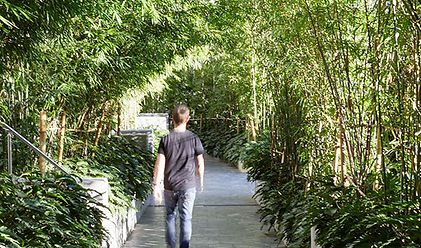Latest articles on the wonders of utilising Biophilic Design in the built environment

Why biophilic design is important for our health – and why it’s here to stay
The concept of biophilia has informed the thinking of many contemporary designers. The ideas are reflected amongst the multi-residential and commercial high rise buildings seen in our cities, with rooftop gardens, planter boxes and plantations lining the exteriors of these places in an attempt to satisfy our subconscious desire to seek a connection with nature.

Neurodiversity and Biophilia: the Future of the Workspace in the Post-Pandemic Era
The Coronavirus pandemic demanded new needs and significant changes in our lives: in relationships, at work, in consumption habits, in increasing inequality. Indeed, the theme of workspaces came up in a historical moment when people saw their own freedoms limited for the first time in the postmodern era.
Must.Do.Education
Here you can learn how to implement ‘Biophilic Design in the Home’ with the Oliver Heath Design School

Increasingly we are seeing a need to implement Biophilic Design into our spaces; from the office to our homes, compelling research shows that using a human-centred design approach brings a closer link to nature and subsequently improves our health and wellbeing. The Oliver Heath Design School provides insightful and thought-provoking Biophilic Design courses - the perfect way to start your journey into human-centred design thinking.
Must.See.Videos
What happens if you cut down all of a city's trees? - Stefan Al


What happens if you cut down all of a city's trees? - Stefan Al

Biophilic Design

Increasing Employee Wellbeing Through Biophilic Design

How to Become a Plant Design Pro | Alexander Bond Masterclass
Must.See.Documentary
"Biophilic Design is an innovative way of designing the places where we live, work, and learn. We need nature in a deep and fundamental fashion, but we have often designed our cities and suburbs in ways that both degrade the environment and alienate us from nature.
The recent trend in green architecture has decreased the environmental impact of the built environment, but it has accomplished little in the way of reconnecting us to the natural world, the missing piece in the puzzle of sustainable development.
Come on a journey from our evolutionary past and the origins of architecture to the world’s most celebrated buildings in a search for the architecture of life.
Together, we will encounter buildings that connect people and nature - hospitals where patients heal faster, schools where children’s test scores are higher, offices where workers are more productive, and communities where people know more of their neighbors and families thrive. Biophilic Design points the way toward creating healthy and productive habitats for modern humans."









